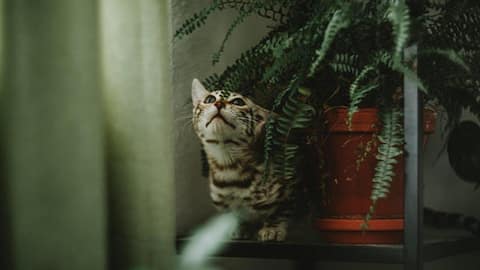Recognizing and avoiding toxic flowering plants for pets
What's the story
With the arrival of spring, the anticipation of blossoming flowers in forests, fields, and gardens grows. Yet, amidst the beauty lies the potential danger for our pets. Before introducing new plants into our homes or gardens, understand which ones may harm our furry companions. Minnie B. Miller, an avid pet enthusiast and aquarist, warns against common flowers which may harm pets.
Peace lilies
Peace lilies - calcium oxalate
These easy-to-care-for plants should be kept away from pets because of their calcium oxalate crystals. Ingesting peace lilies or their pollen can cause excessive drooling, vomiting, swallowing difficulties, and mouth irritation in cats and dogs. Miller also warns against placing these plants near aquariums, as the crystals, if consumed by fish, may lead to stomach problems, respiratory issues, and irritation.
Hyacinths
Hyacinths - alkaloids
Hyacinths, belonging to the lily family, pose a threat to pets due to their alkaloid content, particularly in the bulb. Ingestion of these plants can result in severe vomiting, tremors, bloody diarrhea, and elevated heart rates in dogs and cats. Such symptoms may induce rapid breathing and other respiratory complications. It's essential to keep hyacinths out of reach to prevent harm to pets.
Tulips
Tulips - tulapin
The tulip bulb contains toxins known as tulipalin. These substances are part of the plant's defense mechanism against herbivores. When ingested by pets, especially cats and dogs, these toxins can cause a range of adverse effects, including gastrointestinal irritation, neurological symptoms such as seizures, and cardiac abnormalities. It is therefore crucial to keep pets safe from consuming tulips necessitating precautionary measures, suggests Miller.
Chrysanthemum
Chrysanthemums - pyrethrins
Chrysanthemums contain pyrethrins, natural insecticides found in plants, which are harmful to pets. Ingestion can lead to gastric problems, decreased appetite, and excessive drooling. Pyrethrins, when consumed in larger amounts may cause depression and coordination issues in dogs and cats. It's crucial to be cautious with chrysanthemums around pets, ensuring they're kept out of reach to prevent accidental ingestion and potential health complications.
Daffodils
Daffodils - alkoloids
Daffodils, containing toxic alkaloids like lycorine, pose a threat to pets if ingested. The bulbs, stems, and leaves contain these compounds, with the bulbs being especially hazardous due to their resemblance to onions, attracting curious pets. Consumption can lead to vomiting, low blood pressure, convulsions, and cardiac issues. To safeguard pets, owners must keep daffodils out of reach.
Other plants
Research plants
Kalanchoe can cause stomach upset and irregular heart rhythms in pets, whereas Amaryllis ingestion may lead to abdominal pain, tremors, vomiting, and diarrhea. Sweet peas may cause weakness and lethargy potentially leading to seizures or death. It is essential to research plants thoroughly before planting or receiving them as gifts to prevent harm to pets, including nuts, leaves, berries, seeds, or sap, highlights Miller.
